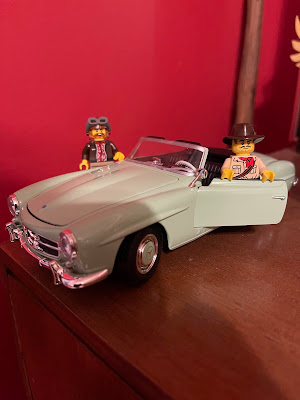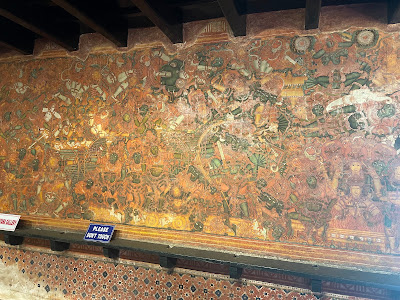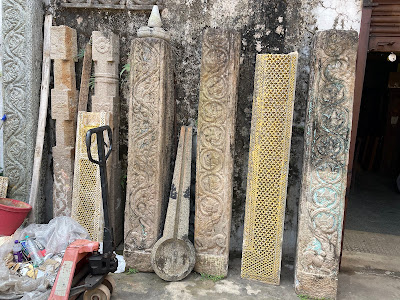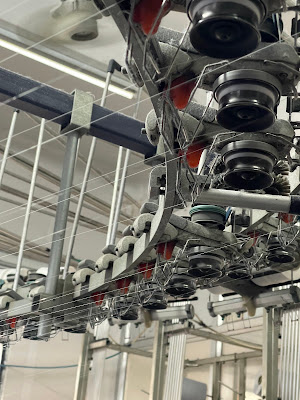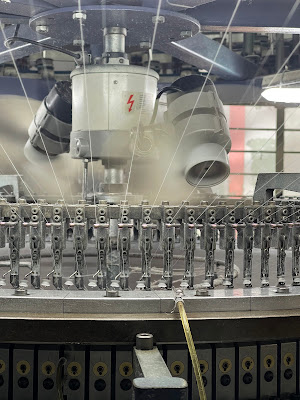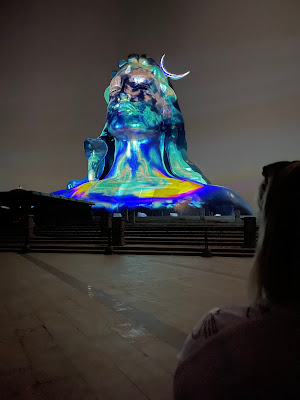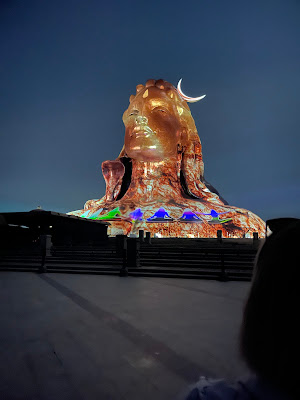I came down the grandly curving, Venetian plastered staircase in the
morning to find the rest of my family in the dining room, being
served breakfast by the house staff. It was there that we met my
parents’ friend, an elderly but vigorous, booming gentleman whom
I’ll refer to as The Boss. Escorting him was one of the drivers
from the previous evening, a softly-spoken, somewhat intense man who
I’ll call Mr Fixit, for reasons that will become apparent.
The Boss
was welcoming, and chatted warmly with my mother, but I think my
sisters and I were a little intimidated, as we sat under an 18th century oil painting of Jesus at the Wedding at Cana that was bigger
than a car parking space, while silent servants quickly brought him
coffee and cleared the breakfast things away. Having been appraised
of the disaster of our lost luggage, he asked Mr Fixit to drive us
over to the shopping mall so that we could buy some fresh clothes and
toiletries. He then took his leave, promising to meet us again at
dinner over at his house next door.
When we
were ready, Mr Fixit loaded us into the same luxury European SUV that
had collected us from the airport, and drove us down the congested
and chaotic Indian roads to the shopping mall. Or more specifically,
The Boss’ shopping mall. When my mother had mentioned that he owned
a shopping mall, I’d pictured a little arcade on a largish
commercial block. In reality, however, it turned out to be a
sprawling complex across several acres, with aircraft hangar-sized
clothing boutiques, a modern department store selling everything from
cosmetics to iPhones, a supermarket, a gym, gift shops, coffee stalls
and India’s biggest Starbucks.
There were
guards at the gate to the complex, who recognised the car and
immediately ushered us through, and Mr Fixit bypassed the parking lot
to drop us outside the first of the clothing stores that met his
standard – he dismissed the others as too cheap.
Inside, I
grabbed a couple of undershirts, sleeping shorts, socks and
underwear, along with some toiletries sufficient to tide me over
until my luggage eventually turned up. When I went up to pay, Mr
Fixit gestured for me to go to an unattended till away from the queue
of people waiting to pay, summoned a startled cashier, and slapped
down The Boss’ credit card. He then did the same in other stores
for my sisters and mother, also paying for underthings, cosmetics and
dresses to replace what they were wearing.
Back at
the house, I asked my mother what Mr Fixit’s role actually was.
“He’s
The Boss’ right hand man,” my mother said.
“So,
like his PA?”
“Oh no,
he has a personal secretary.”
“Like a
butler or a valet, then?”
“No, he
has a valet. You’ll meet him later.”
“So,
what is he then?”
“I
already told you. He’s The Boss’ right hand man.”
“No, I
mean what’s his job title in The Boss’ company HR system? He must
have one, otherwise how does he get paid?”
“Oh,
some sort of manager, I guess. Things work differently here, dear.”
And that’s
about as far as I got with that.
In the
afternoon, Mr Fixit drove us out to one of the few tourist
attractions in Coimbatore; the Isha Yoga Centre, which is, according
to all of the marketing material, a giant bust of Adiyogi Shiva
sitting in a field in the shadow of a beautiful mountain. When we got
out there, we were to meet The Boss’ daughter-in-law, who’d
organised a guided tour of the giant head. We wondered what could
actually be learned about a giant head sitting in a field, especially
what might take four or five hours to learn, which is the amount of
time allocated to this activity.
Fortunately
it turns out that the giant head is just the symbol of the Isha
Ashram, and the rest of the ashram sprawls out behind it, with a
temple, ritual bathing pools, shrines, and, because yoga is as much a
business as it is a form of spiritual discipline, fancy shops.
Outside
the temple area we met our guide, a mild-mannered musician from
Berlin named Victor, who is an annual visitor to the ashram and thus
in a good position to guide us around the campus. We never did learn
quite who had volunteered his services, but he seemed happy enough to
show us around.
Yoga is a
weird phenomenon, especially in the modern era. It’s halfway
between a cult, a scam, a religion, a social nexus and a wellness
regime, and we saw all of those sides on our tour.
Victor
showed us the male bathing pool, sunk deep in the earth with towering
granite walls on three sides, with the three urns in the centre
spotlit with such subtlety that it was almost possible to believe
that they were just glowing slightly from within.
We then
went to the women’s bathing pool, and while the ladies in our party
entered, Victor, Mr Fixit and I chatted outside. Victor revealed that
he will soon be doing a special ascent of the mountain in bare feet,
as a sacred act of endurance. He was keen for Mr Fixit’s opinion as
a local.
“Are
there tigers in the hills?” Victor asked nervously.
“There
are tigers everywhere,” said Mr Fixit, in a tone simultaneously
nonchalant and ominous.
“Oh,”
said Victor.
Once the
women were ready, we visited a shrine with a long queue of pilgrims
waiting to enter, but it turned out that we could bypass the queue by
buying a stack of offerings, an option that The Boss’
daughter-in-law took up without hesitation. Inside, we lit candles,
tied an ochre string around a mass of other ochre strings, and
slipped down to the shrine itself to symbolically wave the smoke from
a row of candles over our heads. A couple of grouchy staff tried,
momentarily, to control our movements, but Victor overrode them in a
way that they had clearly never been overridden before, judging from
their perplexed reactions.
But enough
of the spiritualism – time for some shopping! Is all of this ritual
a bunch of spiritualist bollocks peddled by a guru who’s making
millions off this thing? Yes, it is. Did I buy organic cotton yoga
pants at one of his fancy shops? Yes, I did. And they are
sensationally comfy.
When Mr
Fixit noticed a statue of a sleeping elephant god outside one of the
fancy shops, he took several photos of it (despite the fact that we
were in the temple area in which photography was forbidden), saying
that it’s exactly the sort of thing his boss might like to buy.
“I don’t
think it’s actually for sale”, Victor interjected.
Mr Fixit
shrugged good-naturedly and said, “Everything’s for sale.” So
that was that.
As evening
fell we made our way back to the giant head for the daily “light
show”, and were ushered into our VIP seating area as close to the
head as it’s possible to get without actually being part of the
show. Normally this area is where a handful of lucky, extra devout
pilgrims get to squat on the ground in the shadow of the giant head,
but they were shifted a little to the side and chairs for our party
had been set up. Poor Victor seemed increasingly discombobulated that
this party of guests were cheerfully steamrollering their way to the
front of every queue, ignoring inconvenient parking areas and just
parking next to the giant head, and getting seated in a private VIP
area closer to the giant head than any of the genuine yoga pilgrims,
all with the blunt but adroit use of money. I’m pretty certain that
“throw cash at it until you get what you want” isn’t a central
tenet of yoga, at least not officially. I felt for him.
The light
show turned out to be a sophisticated projection system, which played
intensely focused animations onto the giant head, drenching it in
gorgeous splashes of colour and turning its hair into flames or its
skin into glass. It was simple but spectacular, and the crowd of
thousands, somewhere off behind us in a dusty field, went absolutely
nuts for it.
After
driving back to Coimbatore, we received an update on our luggage, as
we sat in The Boss’ garden pavilion drinking gin and tonics. The
news was… evasive. From what I could understand, the staff at
either the airport or the airline were not being sufficiently certain
that our luggage would arrive on the evening flight from Singapore,
or if it did, whether it would be available that evening. Maybe there
were going to be logistical issues? Or maybe customs issues? They
were allowing for any eventuality.
This did
not sit well with The Boss. In what I’ve quickly learned is an
ominous gesture, he drew out his personal mobile (which is an
extremely incongruous shade of iridescent pink) and made one or two
brief, quiet calls. Then he suggested we go in to dinner.
Dinner in
The Boss’ house is held late, has three courses, and is served by
his valet, Mr Fixit and as many other house staff as needed. Guests
are not permitted to serve themselves, but instead the staff move
about the room dispensing huge portions of flat breads, rice, various
curries, chutneys and yoghurts, then retreat to the edge of the room
to watch like hawks for any spare space to appear on anyone’s plate
so that they can rush in to fill it with more food. Resistance to
their serves is ignored.
During
dinner, it was reported back to us that our luggage had indeed
arrived on the evening flight, so after dinner, just a little before
midnight, my sister and I were driven out to the airport to collect
it. We were met in the terminal forecourt by a gaggle of apologetic
and slightly terrified airport staff, who refrained from the previous
night’s grind of Indian paperwork and loaded the bags into the car
after getting a single signature from my sister.
When a
demi-billionaire talks, you listen. Or else.

